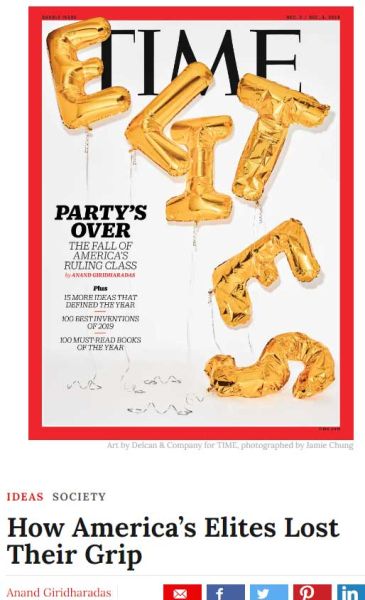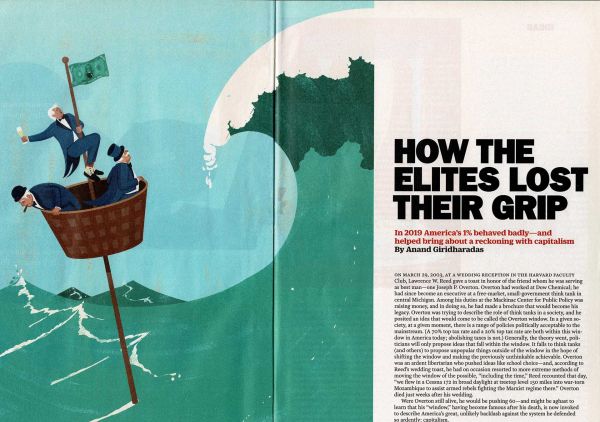Who is Anand Giridharadas?
Who is Anand Giridharadas?
I first came across Anand's name in an issue of Time magazine that featured his article on elitism as its cover-story. Once you see Anand, you can hardly miss his dark, hardened, resentful features, nor his salt-and-pepper pompadour. He is an American citizen with Indian parents. Wikipedia reports in its article on him that his visits to India gave him a new perspective about life, but he does not write about India's many problems. He saves all his hostility for this country, its wealth, and captitalist system.
The above caricature employs all the elements of Nazi-era, anti-capitalist agit-prop. In effect, Anand only needs to put Jewish features on the rich White guys to do what the Nazis did. The phrase "rich White guy" resonates in the left-wing community as an acceptable, demeaning moniker. The envy and resentment that empower Anand's caricature offer would-be dictators the opportunity to hawk their own destructive panaceas to gullible followers. Anand helps to mobilize their negative energy.
Mature, level-headed readers, however, want something more from a social-critic like Anand. The want to see a wholistic appraisal of America's performance—jobs created, an informed overview of economic conditions, and its social environment. They want Anand to give them an informed list of proposals to make improvements, reforms, even a replacement system for something that has failed. Anand does not do this. He gives readers instead a fairly tempting list of payback options. He concentrates on tearing down systems rather than improving or remodeling. He probably comprehends on some level that this approach only appeals to nihilistic readers who want to hear his negative hype.
Anand has only anger and vindictiveness to offer a thinking man interested interested in creating durable, doable systems. Anand does not communicate that he cares about private wealth-creation, nor about energizing industrious people to start successful enterprises. He never bothers to explain why so many immigrants come here, that they might want a piece of the action. The idea of a vibrant economy does not interest him.
After Anand and his ilk get finished their work, the nation of wealth will shrink to include only a few entitled persons who play along with the egalitarian charade, those who join the political elite, and other arm-twisters in the leadership. "Meet the new boss; same as the old boss!" Nothing new here. The same old oppression and political favoritism that have haunted every socialist scheme. The only way you can advance is to get in good with the bosses.
In his Time magazine article, Anand declares his support for Senator Elizabeth Warren, who ran for President of the United States in 2016, in order to represent the Democratic Party. Anand writes that Warren wants to institute a wealth tax and eliminate private insurance. Anand does not worry that she identifies as a conservative. Soaking the rich and replacing private business with a government mandate works for him.
"With her now-famous litany of 'plans'," Anand writes, "Warren detailed an agenda that would put American business in a headlock. That she and Sanders, both veritable enemies of Big Business, are among the top candidates, shows how much the politics of capitalism has changed." He continues that Warren and Sanders want to "redefine the purpose of a corporation to promote an economy that serves all Americans."
A lot of presumptions here. An economy that serves all Americans sounds like one that will serve mostly socialist intentions, which less than half the nation's population supports. He reveals a few general proposals that mostly dish out payback. Senator Warren's term "headlock" says it all—just some rabble-rousing agit-prop. There's no explanation of how any of his proposals will improve the conditions for anything. Anand's books read like his articles—long on criticism of Capitalism and wealth, short on substantive measures to make things better. He appeals mostly to readers who only want to dish out payback against the wealthy.
In Time's "Sinking Ship" illustration, figures of rich White guys cling to the mast of a sinking ship—rich, old White guys—a fairly antiquated view of the wealthy, from the clothes they wear to the mast of the 19th century ship. Maybe Anand needs to update his sense of Capitalism before he tries to cancel it, or maybe consider going back to India and trying to push his agenda there.
He could not be thinking of George Soros and Warren Buffet, who both identify as leftists and have supported left-wing causes since long before those causes gained respectability. Other billionaires like Musk, Thiel, Zuckerberg, and Bezos are too young to fit the mold of the oldsters in the parodic picture.



